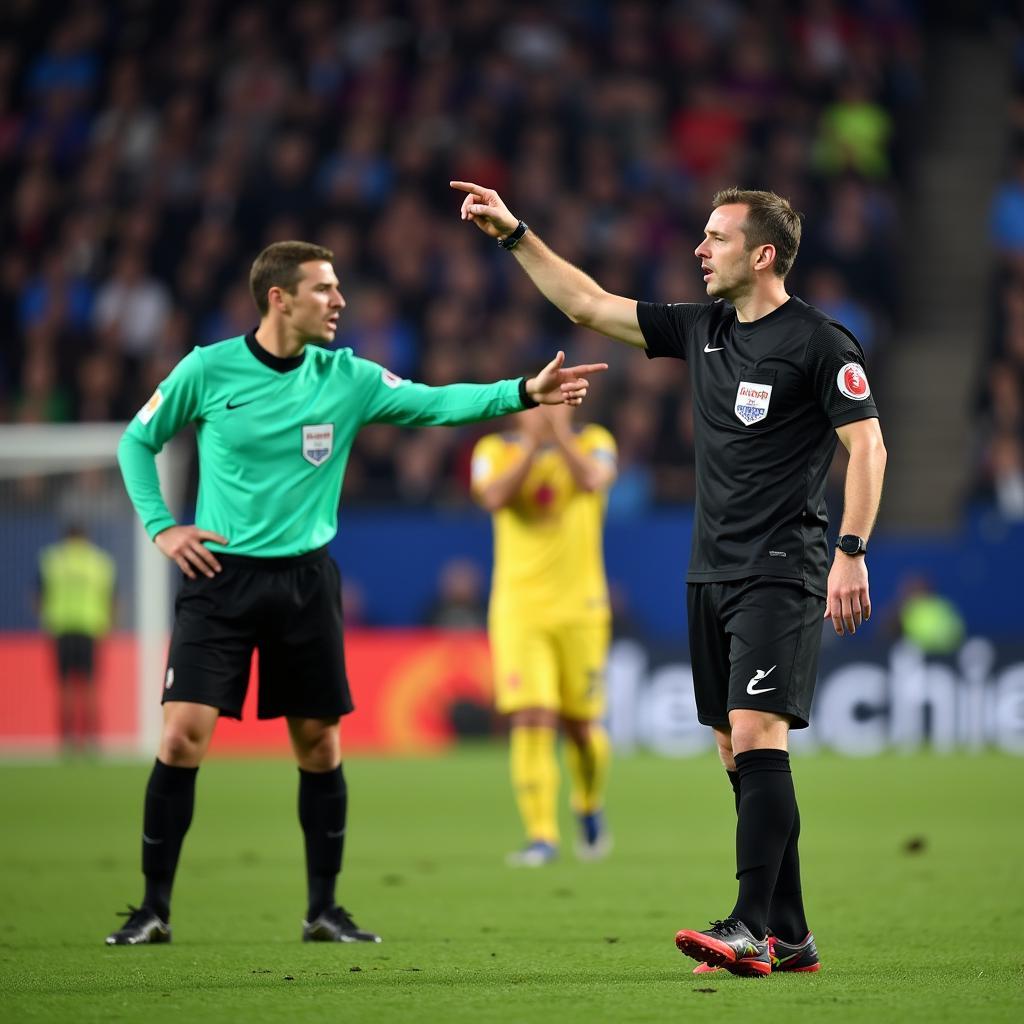Player Showing Middle Finger to Referee: A Controversial Act in Football
December 5, 2024The act of a player showing the middle finger to a referee is a serious offense in football, often leading to severe consequences. This article explores the reasons behind such behavior, the potential repercussions, and notable examples of this controversial act.
Why Do Players Resort to Such Behavior?
Frustration, disagreement with a call, and momentary lapses in judgment can all contribute to a player directing such a disrespectful gesture towards a referee. The pressure of a high-stakes match, coupled with the emotional intensity of the game, can sometimes lead players to react impulsively. Often, players feel that a referee’s decision has unjustly impacted the game’s outcome.
The Heat of the Moment
In the heat of the moment, players can lose their composure and act in ways they later regret. The adrenaline pumping, the roar of the crowd, and the intense desire to win can cloud judgment and lead to regrettable actions. While this doesn’t excuse the behavior, it provides some context for understanding why it might occur.
Perceived Injustice
Players might feel that a referee’s decision is unfair or biased, leading to a feeling of injustice. This sense of being wronged can trigger an emotional outburst, resulting in inappropriate gestures like showing the middle finger. This feeling is particularly strong when a decision is perceived to have directly influenced the game’s outcome, such as a penalty awarded against their team or a goal disallowed.  Referee Making Controversial Call Player Reacting
Referee Making Controversial Call Player Reacting
Consequences of Showing the Middle Finger to a Referee
The repercussions for such behavior are significant. Players can face disciplinary action from their club, the league, and even governing bodies like FIFA. These sanctions can range from fines and suspensions to, in extreme cases, bans from the sport.
Disciplinary Action from Footballing Authorities
Governing bodies take such offenses seriously. They strive to maintain respect for the officials and the integrity of the game. Showing the middle finger undermines the authority of the referee and sets a bad example for younger players and fans.
Damage to Reputation
Such acts can also damage a player’s reputation and public image. Sponsors and fans may view the player negatively, impacting endorsements and overall career prospects.
Notable Examples and Case Studies
Throughout football history, there have been instances of players showing the middle finger to referees, often resulting in significant disciplinary measures. Analyzing these cases offers valuable insights into the varied contexts and consequences associated with this controversial act. While specific examples are readily available online, it’s important to remember that these incidents are not to be condoned but rather serve as learning experiences for players and fans alike.
Expert Insights
According to renowned sports psychologist, Dr. Emily Carter, “Such behavior often stems from a deep-seated frustration and inability to manage emotions effectively under pressure.”
Former Premier League referee, Mark Clattenburg, adds, “It’s a sign of disrespect not only to the referee but also to the game itself. Players have a responsibility to conduct themselves professionally, regardless of the circumstances.”
Conclusion
Showing the middle finger to a referee is a serious offense with significant consequences. While frustration and perceived injustice can contribute to such behavior, players must learn to manage their emotions and maintain respect for the officials and the game. Understanding the reasons and consequences of this controversial act is crucial for maintaining the integrity and spirit of football. Remember, respecting the referee is respecting the game.
FAQ
- What are the typical punishments for showing the middle finger to a referee?
- Can players appeal decisions related to this type of misconduct?
- Are there cultural differences in how this gesture is perceived in football?
- How does this behavior impact the image of the sport?
- What can be done to prevent such incidents in the future?
- What role do coaches and team management play in addressing this issue?
- How can players develop better emotional control on the field?
For support, contact Phone: 0396443476, Email: [email protected] Or visit us at: 23 Tháng 3, Đắk Nia, Gia Nghĩa, Đắk Nông, Việt Nam. We have a 24/7 customer support team.